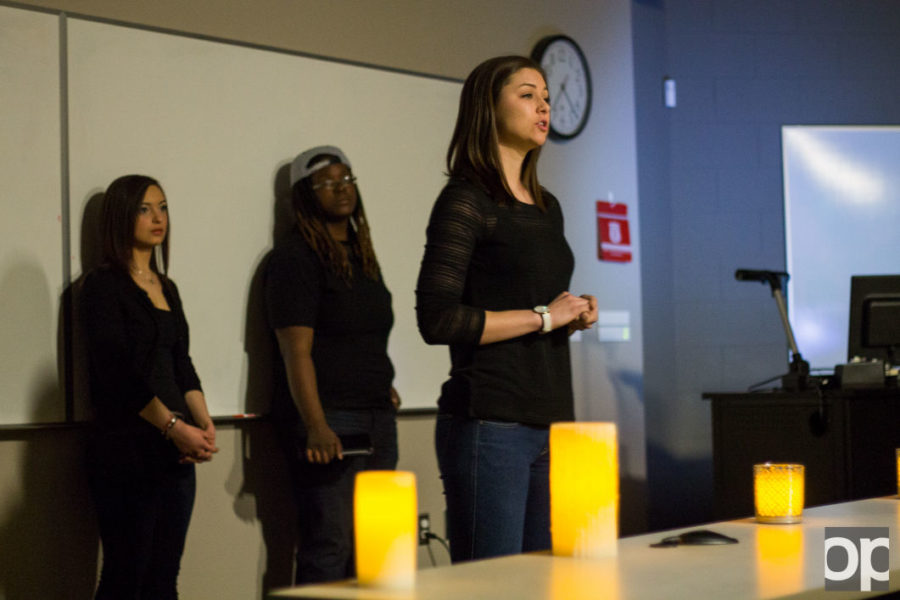Comfort in your own skin
Supermodels, actresses and professional dancers are the commonly accepted demographic – not college students.
“They don’t discriminate,” Graham Health Center (GHC) senior staff psychologist Dr. Laura Sanders said. “Anyone can be affected.”
Eating disorders can affect a multitude of individuals and have no regard for gender, race or socioeconomic position.
“’Eating disorder’ is the clinical diagnosis, while disordered eating is on a continuum,” Sanders said.
Sanders explained that one’s likeliness to develop an eating disorder comes down to a multitude of personal factors like temperament, personality and genetics.
“If you don’t have an eating disorder, you don’t [understand] what it’s like,” Sanders said.
“If you use drugs and decide you want to stop, you can, but we all have to eat,” Dr. David Schwartz, psychologist and director of counseling at GHC, said.
Signs and symptoms
Sanders said that if an individual is demonstrating eating behaviors that are out of his or her personal “normal,” it may be an indication of an eating disorder or disordered eating.
“It’s an issue if it’s interfering in a significant way with any parts of life,” Schwartz said.
According to Sanders, repetitive dieting, overeating, not allowing yourself to eat when you’re hungry, over exercising, and feeling like you can’t go a day without engaging in one of those activities are indications that an eating disorder may be present.
Schwartz and Sanders said that there are three main types of eating disorders that they see in the college-age group of students 18-25 years old: anorexia, bulimia and binge eating.
Sanders said that anorexia is categorized based on “food restriction, lower than appropriate body weight and interruption of normal function in work or school.”
“I see more purging through exercise,” Sanders said about bulimia, in which people usually use vomiting as a way to “purge” their body of food they’ve eaten.
“I do see a lot of binge eating disorder,” Sanders said.
“The person is usually of normal weight or overweight,” Schwartz said.
“[Binge eating] is now a disorder,” Sanders said, “commonly resulting in guilt associated with eating.”
Treatment options
“When we see disordered eating, we work with that just like anything else because it’s a symptom,” Sanders said.
“When I work with patients,” she said, “I take a two-pronged approach of what’s behind the [behavior] and what are the emotional pieces we need to address.”
There are a wealth of resources at the GHC on campus for those who think they might be developing or dealing with an eating disorder.
Psychiatrists, individualized counseling and therapists are available to students at GHC, in addition to “connections in the community for referral resources, too,” Schwartz said.
GHC screenings, a useful tool
Several times a year, the GHC gives students an opportunity to learn about themselves and conditions that commonly affect individuals in the college-age group by administering voluntary screenings.
“[The screenings] get people thinking about a topic and get to know us and that the counseling center is here,” Schwartz said.
Screenings consist of 26 questions that are meant to “get students thinking and help with self reflection,” Schwartz said.
The screenings cover anxiety, depression, alcohol use and eating disorders, throughout the school year.
Schwartz estimated between 40-60 individuals took part in the eating disorder screening this year, which, he said, was a vast improvement over the 5-20 that have participated in the past.
Schwartz said that coaches often suggest that their student athletes participate in these screenings to keep tabs on their own wellbeing and healthy habits so they can perform athletically and academically to the best of their abilities.
GHC counseling is here to help
There are a multitude of options when it comes to getting treatment on campus for an eating disorder or disordered eating behaviors, and Schwartz and Sanders emphasize the importance of recognizing symptoms before one’s condition becomes serious.
“We recommend a physical and blood work to rule out anything medical,” Sanders said.
This allows the GHC counselors to find the best course of action for each individual’s treatment.
“We always do an assessment as a first step,” Schwartz said, and if necessary, GHC is there to refer patients to specialized treatment teams in the community.
“We’re here for friends, too,” Schwartz said, reminding students of the importance of looking out for roommates, buddies and loved ones.
Schwartz explained that friends of individuals who may be suspected of demonstrating at-risk behaviors are able to call GHC for free and speak with a counselor to come up with a plan and go over the best options for that particular friend.
In conjunction with GHC, health and wellness director Julie Proctor coordinated “The Body Monologues,” which took place on March 5, 2015, to bring awareness to the importance of feeling comfortable in one’s own skin.
“’The Body Monologues’ are monologues written by actual people who have or have had body image issues or eating disorders,” Proctor said.
“The purpose of this entire week is to increase awareness around eating disorders and to help people understand how sly eating disorders can be…how big they can be,” Proctor said. “They can take over your life.”
“It’s best to stop disordered eating before it becomes an eating disorder.”



